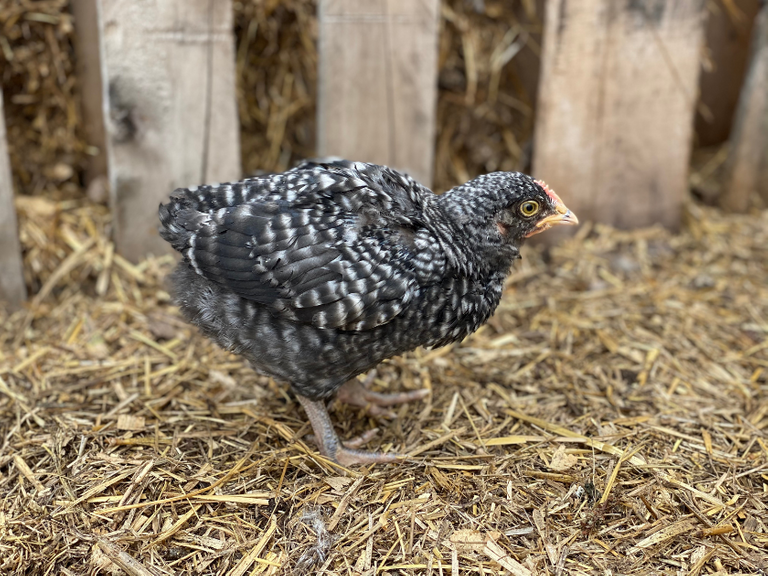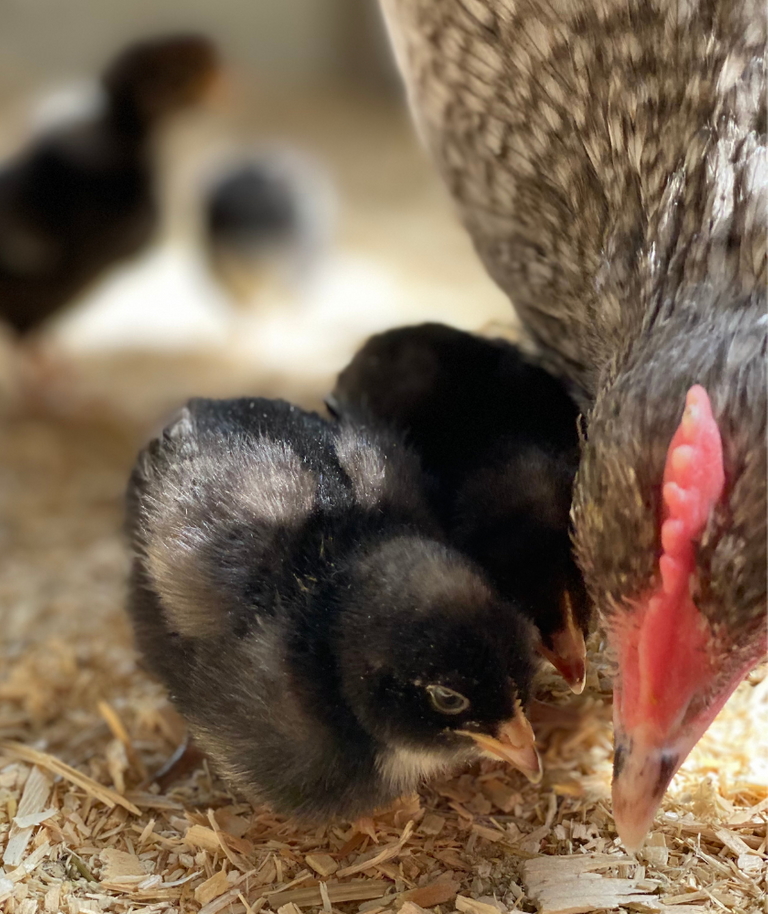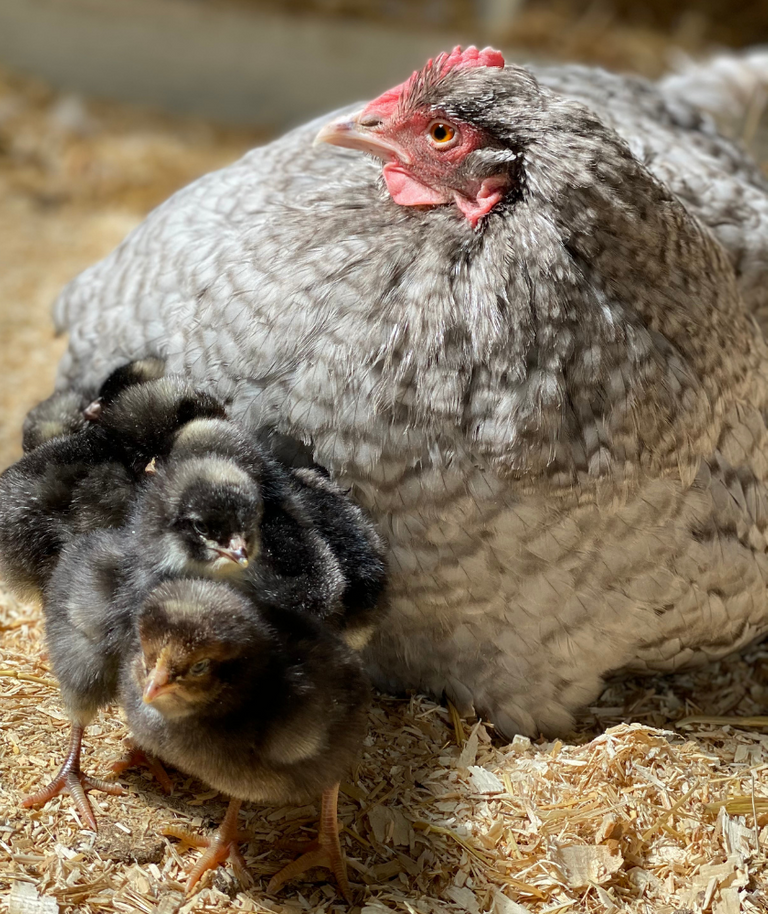In this article I share the 5 most important things you need to know about raising chickens. If you are considering getting chickens for the first time, I hope this article gives you confidence.

I remember how overwhelming it was when Jon and I got our first box of chicks. We didn’t know a single thing about chickens. I was raised on a big farm with thousands of cattle, and some horses – but never chickens.
I didn’t know what a brooder was.
I didn’t know what pullets were.
I didn’t know what chickens ate.
I didn’t know there was so many different breeds.
I didn’t know if I wanted to raise them for eggs, or raise them for meat.
I didn’t know anything about chicken coops or nesting boxes.
I didn’t know anything about butchering.
I didn’t know about chicken social structures, and aggressive roosters.
We just bought the chicks, and we didn’t know anything. Perhaps this was the smartest things we’ve ever done.
I say this, to encourage you to start before you’re ready.
How do you get chicks? Do you want pullets, or cockerels, or both? Do you want to raise chickens for meat, or eggs, or both? What do chickens eat? What do you do with chickens in the winter? Do chickens need heat?
There is so much more to learn about raising chickens but I hope this brief article gives you the confidence to start. These are some of the most important topics you need to know before getting started with chickens.

Important Things You Need to Know About Raising Chickens
#1. There is THREE ways you can obtain chicks.
We’ve done it all three ways. Choose one that suits your situation best, or go for all three!
From a local farm: This is a great way to support a small farm. You’ll also be able to find more interesting or unique breeds like fun backyard mixes or purebred heritage breeds. If you buy from a small farm, be sure to have a look at their flock to make sure they are healthy and there is no risk of disease. Purchasing chicks from a local small farm also means travel will be less stressful for them.
From a hatchery: Hatcheries will offer the most popular breeds for both meat, egg production, or dual purpose. You can place an order for your chicks online, or by calling. The more chicks you buy, the cheaper it is, per chick. The chicks can be delivered through the mail or picked up directly from the hatchery. Traveling through the mail is a stressful experience for the chicks. If you can, pick them up directly from the hatchery. Brand new chicks can survive on their yolk for three days without food or water.
Hatch eggs at home: Hatching eggs at home is a really fun experience, and it’s the most self sufficient method. Watch your local ads for fertilized eggs for sale. They can be hatched in a homemade incubator or a store bought one.
The best way to hatch eggs is with a broody hen (a hen that has the urge to sit and hatch eggs). Some farmers end up with more broody hens than they need, and would be happy to sell one to you (and maybe a dozen fertilized eggs, too). It’s a risk to take on a broody hen because you never know if she’ll actually commit to sitting on the nest, but if she is successful, then you’ve got yourself a sweet deal. Click here to read more about hatching chicks at home.
#2. Pullets or Cockerels.
Pullets are young female chickens that haven’t laid an egg yet. Cockerels are young male chickens. Sometimes when you purchase chicks you can choose to have them sexed. This way you’ll know how many males and females you are getting.
Most farmers that order chicks from hatcheries prefer to only get pullets. Their meat is what we are all used to eating from the grocery store (Cornish Cross hens). Hen’s also lay eggs. The pullets (hens) have significant purpose on a homestead.
Sadly, roosters aren’t good for much. One or two is great to have with a small flock of hens- they complete the social structure and provide fertilized eggs. But, too many roosters causes a lot of disturbance, their meat is less desirable, and they don’t lay eggs.
You’ll need to decide if you’d like to purchase sexed or unsexed chicks.
We’ve always decided to accept the cockerel chicks, too. Once they reach maturity at about 12 weeks, we butcher them. Their meat is a different disposition, but they are perfectly edible. We prefer to give their life meaning in this way, rather than have them discarded at the hatchery.
#3. Meat or Eggs.
Pullets or cockerels can be raised for meat. The large breasted chickens that we are used to eating from the grocery store are the Cornish Cross Hens. They grow huge breasts, fast. They can be butchered after only 8 weeks (sometimes sooner for a small rotisserie chicken).
Dual purpose breeds such as the Opingtons will need about 12-16 weeks to grow. They will give you nice meat but not the impressive breasts like the Cornish Cross.
Cockerals can also be raised and butchered at about 12 weeks old. Their meat is darker, the breasts are flat and long, but they have excellent flavour.
A popular egg laying breed is the White Leghorn. They can lay up to 300 eggs in their first year.
A dual purpose breed like the Orpington will lay 200-220 in their first year.
You’ll need to decide whether you’d like to raise breeds specifically for meat production, or egg production. Or, perhaps you’d like a dual purpose breed that can be raised for either meat or eggs.
#4. Chickens are omnivores.
Chickens love to scratch and forage for their food. They will eat almost anything. Chickens love fruit, vegetables, seeds, grains, insects and meat. If you offer your chickens the table scraps – they’ll go nuts for the bits of meat.
If you can, give your chickens access to areas where they can forage for some of their food, and supplement with extra feed. You can purchase chicken food blended specifically for each stage of their development, or mix your own. In our experience, chickens know what they need and are good at finding it, if given the chance.
#5. Chickens don’t need a heated coop.
Before the baby chicks have grown their feathers, they DO need heat. If they do not have a mother hen to care for them, they will need to live in a brooder. A brooder is a special enclosure designed to keep chicks safe and warm.
Chickens that have all their feathers, DO NOT need a heated coop. If they are provided with heat, they won’t grow the appropriate feathers they need to tolerate the climate. The most important thing is air flow so moisture doesn’t get trapped in the coop. Moisture in the air can cause frost bite on the chicken’s combs, waddles, and feet.
To prevent frostbite on the chickens feet, give them a wide flat perch, such as a 2X4. They will be able to snuggle down and completely cover their feet with their feathers. Also, be sure to bed the ground outside with straw after each snowfall so they don’t need to get their feet cold and wet.
The coop’s ventilation should be placed so that their perch and nesting boxes are not in a drafty zone.
Continue to add clean bedding to the coop to keep the litter dry. Let the bedding remain frozen and do not stir it up. Stirring it could encourage it to start composting…which creates heat…which creates moisture. Also, good luck trying to shovel it out when it’s frozen solid anyways. The deep litter method is the only way to go for us.
Draft free and dry.
We have extremely cold winters. Last winter we had temperatures that reached -50C. In our experience, the chickens do just fine until about -20C (as long as the coop is draft free and dry). Once the temperature drops below -20C, the chickens really slow down and appreciate some supplemental heat. We like to set up these heat panels behind their perch, during the extremely difficult cold times.

The hardest part of raising chickens is the initial learning curve. The first time you raise chicks you’ll want to spend all day with them getting to know them and making sure they’re ok. The first time you butcher, it’ll take you all day just to do 10. But, once you’ve done something once, it’ll be easy after that.
Raising chickens is easy, and a lot of fun.
You know that about 10 years ago, my neighbor's chickens moved to my backyard, I really think she didn't take care of them, so they looked for a more friendly place. At that time my dogs were more obedient compared to the ones I have today, and they respected these animals, they did not attack them, I even saw that some chicks approached them and pecked their legs. These hens were descendants of the breeds used for cockfighting (a practice in my opinion, detestable and cruel), which is why they were low weight and short stature. I had 60 chickens (chickens, hens and roosters), and I consumed fresh and natural eggs, as I fed them corn and vegetable waste. When my dogs died and I adopted others, they did not turn out to be so kind to the birds, and they ended my offspring, as they were chased or killed. This post that you share with us is very valuable, as it offers us simple and practical information on how to do this activity, which is so recommended and important for our economy and nutrition, especially in these times. Ideal if we have a large enough space for the hens or chickens to feel happy. Greetings.
Thank you @sirenahippie! That’s so interesting how you acquired your flock it chickens. They are so great to have around ☺️
Thanks for sharing your experience! I tried to hatch an egg once but I don't think I was doing it right.
Hahaha ah darn hey! Did you sit on it for 21 days?
I should have that might have worked!
Next time I will take a more traditional approach
of buying the chicken before I hatch my eggs.
My childhood was about raising chicken all the time, and now I miss raising chicken. Such a fun activity when we have more spaces in backyard :)
Yes! They are so fun to have around! They work hard all day and look fabulous doing it. 😆
The rewards earned on this comment will go directly to the person sharing the post on Twitter as long as they are registered with @poshtoken. Sign up at https://hiveposh.com.
Well, it looks like we will be rehoming our flock so and starting fresh next year. Thabks for sharing all your insight! I definitely learned something new. I still have so much to learn. -Aimee
Thank you Aimee! 🥰
Congratulations @alexanderfarm! You have completed the following achievement on the Hive blockchain and have been rewarded with new badge(s) :
Your next target is to reach 6000 upvotes.
You can view your badges on your board and compare yourself to others in the Ranking
If you no longer want to receive notifications, reply to this comment with the word
STOPCheck out the last post from @hivebuzz:
I would have said, #1 is to learn your predator load and build for it or plan for it. Losing a flock to predators is awful.
That’s definitely an important thing to consider, and I agree, loosing a flock would suck. There is so much I could have included here, but thought I’d keep it light. There are many scenarios where predators are not the main concern. Free range chickens work well for many people. Keeping chickens safe could be it’s own post because there’s so many different situations and variables.
In our case, having dogs in the yard, and keeping our pigs with the chickens is enough. We don’t even lock our chickens up at night anymore (although I wouldn’t advise it for others). 🙃
It’s a case-by-case thing I guess.